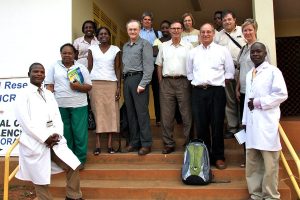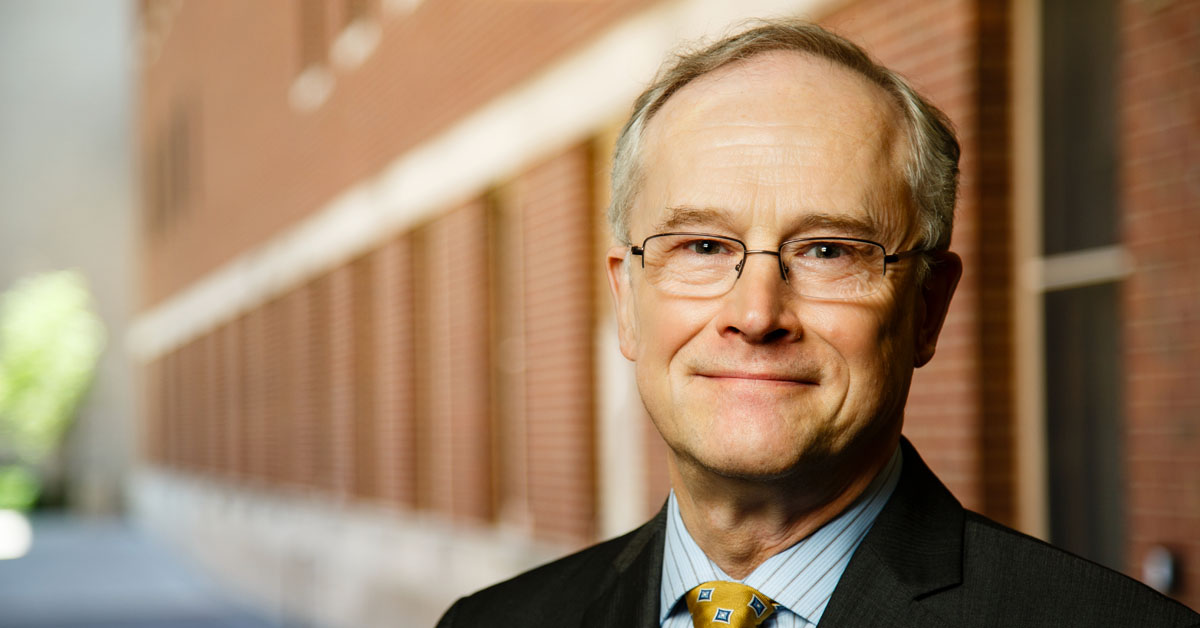When John Finnegan Jr. became dean in 2005, after serving seven years as the associate dean for academic affairs and interim dean, the School of Public Health (SPH) had fewer students and faculty, was modest in its fund-raising goals, and, though it prioritized health equity, antiracism was yet to emerge as a critical focus for research and education. Today, the school is driven in its antiracism goals, continues to grow as a research powerhouse — it currently boasts the second-largest dollar amount of grant awards at the University — and in 2021, it reached the highest fundraising goal in the school’s history of $40 million.
In talking with Finnegan, he chose to highlight a few of the important milestones and transitions from his time as dean. He underscores the fact that these accomplishments — while they occurred during his tenure — happened due to the vision, hard work, and dedication of leadership, SPH faculty, staff, students, alumni, and community members. “In the academic world, purposeful change succeeds when there is consensus about vision and urgency, and a strong coalition to make it happen and sustain it,” says Finnegan.
John Finnegan retires today, January 31, 2022, after 17 years as dean.
Reflections on SPH from 2005 to 2022
Faculty growth

- In 2005, SPH had approximately 90 regular faculty (contract, tenured, tenure-track). Today, that count stands at 123.
- When Finnegan became dean in 2005, less than half of SPH faculty members were women. Today, women comprise 60% of the faculty and the roles of women in school leadership and administration have increased. Professor Dianne Neumark-Sztainer became the first woman to lead the Division of Epidemiology & Community Health in 2015 and eight women faculty members have served or are currently serving as associate deans. This has mirrored a national trend of women’s rising leadership in academia.
- Today, 21% of SPH faculty are Black, Indigenous, or people of color. Although the school today has the most diverse faculty in its history, it is far from where it should be, especially as the diversity of the school’s students increases. (In 2020 and 2021, 30% of students were Black, Indigenous, or people of color. This number does not include international students.)
Diversity, equity, inclusion, and antiracism

- SPH first established a leadership position in diversity, equity, and inclusion (DEI) in 2002. During Finnegan’s tenure, the DEI office grew in size and focus. Today, Lauren Jones serves as director of diversity, equity, and inclusion.
- With support from the Dean’s Office, faculty members Rhonda Jones-Webb, Kathleen Call, and colleagues created the Health Disparities Work Group in 2005 to address health inequities affecting Black, Brown and Indigeous communities. Today, it is the Health Equity Work Group and includes committed faculty, staff, and students from across the school and beyond.
- Faculty in 2020 eliminated the GRE as a requirement for admission to SPH, as did many graduate schools across the country. The test functioned often as a gratuitous barrier for students from marginalized communities seeking advanced graduate and professional training.
- In 2021, the school launched its five-year Strategic Plan for Antiracism to address diversity, equity, and inclusion deficits in the school, and to shape a school culture focusing on antiracism.
- Today, the school’s antiracism initiatives consist of the Office for Diversity, Equity, and Inclusion; the Strategic Plan for Antiracism; the Center for Antiracism Research for Health Equity; the Health Equity Work Group; initiatives and activities in each division; and the work of faculty, staff, students, alumni, and community partners dedicated to this continuing challenge.
Education programs

- The “Re-imagining Public Health Education” strategic planning effort began in 1998 when SPH had about 350 active students, a number that had remained stable for decades and was much smaller than competitive schools. By 2021, active students numbered 1,478 and SPH is annually graduating some 400 students into the professional and scientific workforce.
- Re-imagining Public Health Education gave rise to expansion of graduate, professional, and undergraduate learning options to meet the increasing diversity of student needs. Today the school offers 13 master’s programs; four PhD degrees; nine dual degree options with other UMN schools and colleges; 10 graduate minors; six post-baccalaureate Regents certificates, including the newest one in American Indian Public Health and Wellness; and an undergraduate minor. In 2002, SPH was the first school of public health in the country to require a course in ethics. During 2022, the SPH is working toward University approval of an undergraduate major in public health.
- SPH’s 20 years of investment in distributed learning — a multi-media approach to teaching — has made possible fully online executive degrees meeting the needs of professionals working at a distance, and online courses for regular students and working professionals. In March 2020, in the face of the COVID emergency, faculty and staff working together moved some 90 courses online in a mere two weeks to permit the school to continue its vital education mission.
- In 2006, SPH welcomed back the Master of Healthcare Administration program from the Carlson School of Management where it had moved from SPH in 1997. Since coming back to the school, the program has prospered and expanded and is currently ranked #2 in the country.
Global relationships

- In 2009, the U.S. Agency for International Development (USAID) awarded a grant to SPH, College of Veterinary Medicine, and College of Education to work as partners with African and Southeast Asian countries for planning and workforce development in infectious disease “hot zones.” Relationships developed especially with Chiang Mai University (Thailand), Hanoi University Public Health (Vietnam), and Makerere University (Uganda).
- Relationship building in India led to two programs in Kolkata and Nitte University in Mangalore that provide SPH students with international experiences in public health.
- In November 2021, the National Taiwan University College of Public Health (the first CEPH-accredited CPH in Asia) invited Finnegan to deliver the KP Chen Memorial Lecture in public health. The late Professor Chen graduated from SPH in 1952 with an MPH in Public Health Administration.
Research portfolio and its impact

Since 2005, SPH researchers have generated nearly $1.6 billion in grants and contracts through federal, state, and private foundation sources. The National Institutes of Health (NIH) alone account for about 80% of the school’s annual research funding which is about two-thirds of the SPH total annual budget. School research has a direct impact on lives today. Examples include: Global drug trials studies SMART and START changed the way HIV is treated and saved countless lives; findings from the Center for Antiracism Research for Health Equity, such as Black babies die less often when cared for by Black doctors, are making the link between racism and health care; the learning health systems approach is transferring research findings into patient care more quickly; and Project EAT helps prevent and reduce weight-related problems for young people.
President’s Initiative for the Prevention of Sexual Misconduct
In 2017, then-University of Minnesota President Eric Kaler asked Dean Finnegan to lead the President’s Initiative to Prevent Sexual Misconduct, understanding that it needed to be recognized and treated as a public health issue.
Important COVID work
SPH faculty and students stepped up to assist the Minnesota Department of Health and Governor Tim Walz to increase understanding of the COVID-19 pandemic. Faculty such as Regents Professor Michael Osterholm advised Governor Walz and Commissioner Malcolm, as well as President Joe Biden; Associate Professor Eva Enns and colleagues worked with the state on pandemic modeling; faculty members Ryan Demmer, Kumi Smith, and Rebecca Wurtz regularly spoke to the media to bring clarity to the public; and Biostatistics faculty engaged in multiple investigations of potential COVID-19 drugs.
Philanthropy

Making fundraising more professional and focused, and instituting a campaign cabinet, made it possible to raise new resources of more than $40 million for SPH, an amount never imagined or accomplished before in the school’s history. The funds will go to support world-class faculty, pioneering research, and student success.
Opportunities and advice for the next dean
“The challenges of the past several years are far from over. Our school’s commitments to antiracism as a critical value shaping our missions will continue to develop. COVID has deeply affected the public health workforce. Many older workers have left or are leaving, and the nation’s public health preparedness lacks a functioning national plan. The combination of COVID, structural racism, and climate change underscore more than ever the need for truly ‘upstream’ public health and the vital need to develop systems, plans and policies that build healthy and resilient communities. More than ever, SPH needs increased support from the University to address these challenges.”

